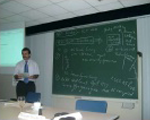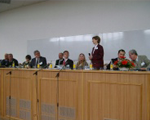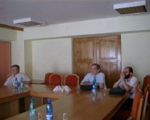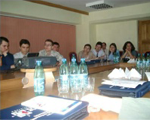Foundation for promoting
Information and Communication Technology
Cisco Networking Academy Program, Constanta, Romania
CISCO Learning Subscription - CISCO® - CCNA® R&S, CCNA® Security,
Cisco® IT Essentials:PC Hardware and Software, NDG Linux®,
PCAP: Programming Essentials in Python,
Cisco® IoT Fundamentals (Arduino, Raspberry PI, Python),
CLA: Programming Essentials in C,
CLP: Advanced Programming in C,
CPA: Programming Essentials in C++,
CPP: Advanced Programming in C++

Cisco Networking Academy Program
Cisco Systems® Company, worldwide leader in technology and innovation, by its representative in Romania and Romanian Ministry of Research and Education, has established a partnership agreeing to join CISCO Networking Academy program. More than 191 other countries have become members of this program, with over 24 million students starting with 1997.
Cisco Networking Academy Program has developed in Romania by virtue of a Strategic Protocol of Collaboration signed by Romanian Ministry of Research and Education and Cisco Systems. This program is meant to update and complete knowledge for people interested in computer networks, in ICT more generally.
As a Cisco Networking Academy, the Foundation for promoting Information and Comunication Technology (ICT Foundation),(in Romanian: Fundatia pentru promovarea Tehnologiei Informatiei si Comunicatiei), Constanta, Romania, delivers a comprehensive, 21st century learning experience to help students develop the foundational ICT skills needed to design, build, and manage networks, along with career skills such as collaboration, problem solving, and critical thinking. With an active presence for over 25 years, ICT Foundation is specialized in courses which prepare students for a career in Information and Communication Technology. Courses are taught by teachers from High School and University. Courses coordinator: Assoc. Prof. Eugen PETAC, Ph.D., Cisco Instructor Excellence Award, Cisco Instructor Excellence Advanced,, Cisco Instructor Years of Service .
ICT Foundation, Constanta, is formed as a Romanian juridical person with private law, nongovernmental, nonpolitical, nonprofit, impartial, independent and with no patrimonial purpose, for promoting Information and Communication Technology in all Romanian social environments.
The advantages of the settled partnership are:
- The students are properly trained for future framing for job selection concerning Information and Comunication Technology;
- The companies will benefit from information and communication technology specialists, proper trained and certified.
At the end of each course the students receive a certificate of completion of each semester, issued by Cisco Systems and countersigned by ICT Foundation, Constanta, Romania, in which the volume and type of material studied and graduate skills are indicated. A course is considered completed with good results by reaching a percentage of minimum 80%. This percentage is obtained as a result of a good preparation of the student as a result of the accumulation of theoretical and practical knowledge, being followed by successful online exams on the Cisco server from the USA, as well as carrying out practical laboratory activities. The online exams that are sustained and the practical activities, are conducted in the laboratory of our institution, targeting each chapter, plus the pre-final and final assessments.
Foundation for promoting Information and Communication Technology (ICT Foundation), Constanta, Romania, was awarded the "2015 Academy Curriculum Excellence Award", in recognition of CCNA Curriculum Excellence and lasting contribution to the Cisco Networking Academy program®, by the Cisco Networking Academy, last April 16, 2016. The annual Academy Curriculum Excellence award is presented to one academy in each region for achieving excellence in teaching a curriculum. The Cisco Networking Academy program uses a rigorous process to select academies for this award based on several criteria. Assoc. Prof. Eugen Petac, Ph.D., received the award on behalf of the ICT Foundation.
NEWS: CISCO® - CCNA® R&S, CCNA® Security,
Cisco® IT Essentials:PC Hardware and Software, NDG Linux®,
PCAP: Programming Essentials in Python,
Cisco® IoT Fundamentals (Arduino, Raspberry PI, Python),
CLA: Programming Essentials in C,
CLP: Advanced Programming in C,
CPA: Programming Essentials in C++,
CPP: Advanced Programming in C++
Cisco Networking Academy Program - Courses
Enrollment
Cisco Systems, world leader in Information and Communications Technology - ICT has put together the program CCNA (Cisco Certified Networking Associate), unique by its content and structure.
CCNA (Cisco Certified Networking Associate) is composed by a theoretical and practical course. At ICT Foundation, Constanta, Romania, the training process is personalized for every student. The theoretical part is presented in English and it can be accessed on-line. This is presented rhythmically and documented in the training program conducted under the direction of a teacher/instructor. The practical part takes place in the Cisco Academy laboratory of the ICT Foundation, Constanta, Romania, which is equipped with computers, software, simulators and proper Cisco Systems equipment. The course cover the networking basics, from Local Area Network (LAN) and Metropolitan Area Network (MAN) to Wide Area Network (WAN).
The course is addresseed to high school and university students, as well as people working in operating, designing, building and maintaining computer networks and modern data communication systems. The course is also recommended for those students who choose interdisciplinary training.
Since the '80's networks, which used coaxial thin cable and which were used mostly for one building, nowadays it has reached a moment when computers, generally intelligent systems, not connected to networks or Internet don't exists. The technologies used for data communication are more complex, the percentage of the people using computers has been exponential during the last decade. In fact, all activity fields use, for various purposes, network computers.
Cisco defines the Internet of Everything (IoE) as "bringing together people, process, data, and things to make networked connections more relevant and valuable than ever before - turning information into actions that create new capabilities, richer experiences, and unprecedented economic opportunity for businesses, individuals, and countries".
In order to ensure professional data communication services it has been proved that professional equipment isn't enough. Qualified specialists are needed with high quality training.
A study conducted by IDC IDC requested by Cisco Systems shows what the situation in the workforce in ICT (Information and Communication Technology). Career development of our graduates is a goal to which we contribute by carrying out a high quality of teaching, appropriate for all activities of the Foundation for promoting ICT (ICT Foundation), Constanta, Romania.
Constanta.
Cisco has created a new version of CCNA, CCNA v7.X version - CCNA Routing and Switching, three semesters, in response to the requests of administrators, instructors and students/trainees in the context of the current development and in the immediate future of the Society. The courses provide relevant lessons with practical aspects, being accompanied by relevant case studies and practical laboratory materials. Depending on the achievements and their educational/academic goals, in the context of basic training that targets a certain level of training, the CCNA training programs caters to different levels of students/learners, from those who know the basics of computer continuing with those analytical skills, to those passionate for developing software systems engineering, system administration/ network administration.
At the end of each semester of the CCNA course (CCNA Routing and Switching, 3 semesters) the students will receive a Certificate of Completion of each semester, issued by Cisco Systems and countersigned by ICT Foundation, Constanta, Romania in which the volume and type of material studied and graduate skills are indicated. A course is considered completed with good results by reaching a percentage of minimum 80%. This percentage is obtained as a result of a good preparation of the student as a result of the accumulation of theoretical and practical knowledge, being followed by successful online exams on the Cisco server from the USA, as well as carrying out practical laboratory activities. The online exams that are sustained and the practical activities, are conducted in the laboratory of our institution, targeting each chapter, plus the practice final and final assessments. The CCNA certification (Cisco Certified Networking Associate), is obtained after the accumulation of knowledge in computer networks and data communications. CCNA program graduates receive discounts of up to 50% to support this certification.
CCNA Security is addressed to those who graduated from the CCNA course described above. It is organized within a semester, involving both theoretical and practical aspects. Being of a similar approach as the CCNA program, CCNA Security provides the premises for training in a field of a great interest, that of security systems and computer networks, in the context of small and medium organizations.
A course is considered completed with good results by reaching a percentage of minimum 80%. This percentage is obtained as a result of a good preparation of the student as a result of the accumulation of theoretical and practical knowledge, being followed by successful online exams on the Cisco server from the USA, as well as carrying out practical laboratory activities. The online exams that are sustained and the practical activities, are conducted in the laboratory of our institution, targeting each chapter, plus the pre-final and final assessments. The CCNA Security certification are obtained by the accumulation of expertise within the courses. CCNA Security program graduates receive discounts of up to 50% to support this certification.
CISCO IT Essentials PC Hardware and Software is a course that, alone or with other courses, targets a number of different professions within the IT&C: Desktop Support, IT Technician, IT Support Specialist, Network Planner etc. CISCO IT Essentials offers the basic training needed in the IT&C field, providing the assimilation of fundamental hardware and software knowledge required to develop a profession in this area. At the same time, the course is also recommended for those who want to enrich their knowledge, both for personal and professional specializations related to IT&C. A course is considered completed with good results by reaching a percentage of minimum 80%. This percentage is obtained as a result of a good preparation of the student as a result of the accumulation of theoretical and practical knowledge, being followed by successful online exams on the Cisco server from the USA, as well as carrying out practical laboratory activities. The online exams that are sustained and the practical activities, are conducted in the laboratory of our institution, targeting each chapter, plus the practice final and final assessments. The CISCO IT Essentials certifications are obtained by the accumulation of expertise within the courses. CISCO IT Essentials program graduates receive discounts of up to 50% to support this certification.
NDG Linux courses, which are organized in three academic semesters in the Cisco Networking Academy program, allow the gain of knowledge which is specific for obtaining Linux Professional Institute (LPI) Certifications, from beginner level to a highly specialized one. The demand for professionals who have Linux skills has increased exponentially in recent years. NDG Linux training program represents a practical and theoretical course, the preparation being personalized for each student, within the Foundation for promoting Information and Communication Technology (ICT Foundation), Constanta. The theoretical part is in English and can be accessed online. This is presented and documented within the rhythmic training program, in training under the supervision of an instructor. The practical part takes place in the Cisco Academy laboratory within the Foundation for promoting Information and Communication Technology, Constanta, which are equipped with Linux operating systems.
At the end of each semester of the NDG Linux Courses(Linux Essentials, Linux I, Linux II) the students receive a certificate of completion of each semester, issued by NDG/LPI/Cisco and countersigned by ICT Foundation, Constanta, in which the volume and type of material studied and graduate skills are indicated. A course is considered completed with good results by reaching a percentage of minimum 80%. This percentage is obtained as a result of a good preparation of the student as a result of the accumulation of theoretical and practical knowledge, being followed by successful online exams on the Cisco/NDG server from the USA, as well as carrying out practical laboratory activities. The online exams that are sustained and the practical activities, are conducted in the laboratory of our institution, targeting each chapter, plus the pre-final and final assessments. The LPI (Linux Professional Institute) certifications are obtained by the accumulation of expertise within the Linux NDG courses. NDG Linux program graduates receive discounts of up to 50% to support this certification.
The Linux Essentials course introduces the world of Linux. The course is useful not only to those who want to become system/network managers, but also to those who just want to use Linux.
Linux Essentials, held during one semester, is an introductory course in Linux, aligned within the LPI Linux Essentials certification. The main topics addressed in the course are: Introduction to Linux; Using the Help; Working with files and directories; Archiving and compression; Scripting; Network Configuration; Security; Users and Permissions. Further details are available here.
Linux I is a course that facilitates the learning the fundamentals which are necessary for a Linux system administrator. Although this course is more advanced than the previous one, which incorporates and deepens the concepts of Linux Essentials, it is useful both to those who want to become system/network managers, but also to those who just want to use Linux. The main topics addressed in the course are: Using Shell; Working with Text Files; File System; System Administration. These topics are added to the knowledge gained in the Linux Essentials course. For further details please see the link.
Linux II course adds new concepts that are necessary for a Linux system administrator. The main topics addressed in the course are: Using Advanced Shell; Display Management; Management of Jobs; Linux Services; Networking; Security System. These topics are added to the knowledge gained in the Linux I course. For further details please see the link.
More informations
Joining conditions: English language at a medium level, knowledge of basics elements in web navigation.
The lecture is hold by Associate Professor Eugen PETAC, Ph.D., Cisco Instructor Excellence Award, Cisco Instructor Excellence Advanced,, Cisco Instructor Years of Service .
Participation fee: 195 EUR per semester, payable in lei, BNR exchange transaction (final price, no VAT). One can either choose full payment for the entire course (three/ four/ five semesters) or to pay for each semester before it starts.
The organizers grant:
1. Qualified professors, from the specialized and certified university and high school teaching staff, with professional degrees certified by Cisco;
2. Modern teaching methods.
3. One by one computer access at a computer upgraded with multimedia;
4. The Customized Training Program provides education, training and support services;
5. Specialized Cisco networking equipment at ICT Foundation laboratory;
6. Customized training program for each individual learner.
7. Latest information, ensured by Cisco Networking Academy.
The courses take place at: The Foundation for promoting Information and Communication Technology (ICT Foundation).
The beginning of the course: will be fixed by a common agreement (between ICT Foundation and students).
We ask you to view the detailed content of the course.
Enrollment: Monday-Friday, 16.00-18.00. Please contact us by phone or email.
NEW: CISCO® - CCNA® R&S, CCNA® Security,
Cisco® IT Essentials:PC Hardware and Software, NDG Linux®,
PCAP: Programming Essentials in Python,
Cisco® IoT Fundamentals (Arduino, Raspberry PI, Python),
CLA: Programming Essentials in C,
CLP: Advanced Programming in C,
CPA: Programming Essentials in C++,
CPP: Advanced Programming in C++
Informatics/ Computer Science Courses
Courses for pupils, students and graduates, groups between 4 and 15, for all levels (beginners, intermediate and advanced classes):
The organizers grant:
1. Qualified professors, from the specialized and certified university and high school teaching staff, with professional degrees certified by Cisco;
2. Modern teaching methods.
3. One by one computer access at a computer upgraded with multimedia;
4. The Customized Training Program provides education, training and support services;
5. Specialized Cisco networking equipment at ICT Foundation laboratory;
6. Customized training program for each individual learner.
7. Latest information, ensured by Cisco Networking Academy.
The organizers offer:
- Computer usage - Introduction (Architecture; Windows; Internet; Editing documents) - 38+2 hours.
- Computer usage - Operating on (Internet; Word; Excel) - 38+2 hours.
- Internet Services - usage, operating and programming notions - 38+2 hours.
- Informatics Systems and Data base - Access applications - 38+2 hours.
- Computer architecture: maintaining, diagnosis , repairing and upgrading (level I) - 38+2 hours.
- Computer architecture: maintaining, diagnosis , repairing and upgrading (level II) - 38+2 hours.
- Computer programming - Pascal (I) - 38+2 hours.
- Computer programming - Pascal (II) - 38+2 hours.
- Computer programming - C, C++ (I) - 38+2 hours.
- Computer programming - C, C++ (II) - 38+2 hours.
- Computer networks and communication services (level I) - 38+2 hours.
- Computer networks and their programming notions (level II) - 38+2 hours.
- Computer networks - Advanced programming (level III) - 38+2 hours.
- Computer networks - Windows 200X administration - 38+2 hours.
- WEB Design - Creating WEB pages - 38+2 hours.
- Internet programming: HTML and Java Script - 38+2 hours.
- Java programming - (I) - 38+2 hours.
- Java programming - (II) - 38+2 hours.
- Linux (I) - architecture; installation; operating; processes ; Internet - 38+2 hours.
- Linux (II) - networks - 44+2 hours.
Enrollment
Details
The courses take place at: The Foundation for promoting Information and Communication Technology (ICT Foundation).
The beginning of the course: will be fixed by a common agreement (between ICT Foundation and students).
We ask you to view the detailed content of the course.
Enrollment: Monday-Friday, 16.00-18.00. Please contact us by phone or email.









